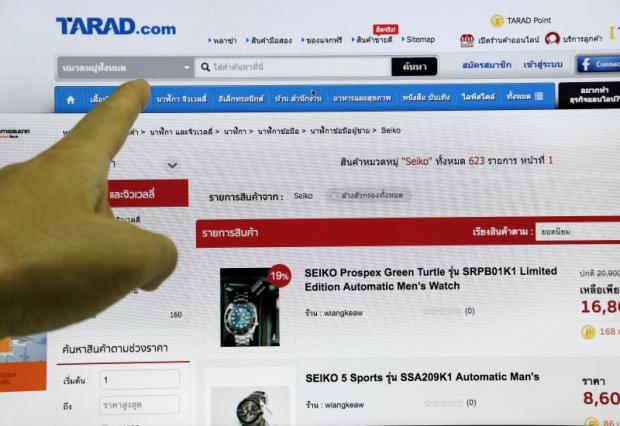
Competition is ramping up in Thailand's nascent e-commerce industry, with larger players fighting to attract lucrative brand deals and local partnerships.
"Thailand's e-commerce segment will continue to have intense competition for at least another five years, reducing the number of major players from 3-4 to only two," said Pawoot Pongvitayapanu, founder of Tarad.com, which is 51% owned by TSpace Digital, the digital arm of TCC Group. "This fierce competition will lower prices and in turn kill off small sellers and dealers upcountry."
While Thailand's e-commerce sector is relatively small at about 3% of the total retail market, Thai e-commerce is expected to grow to US$13 billion by 2025 from $3 billion in 2018, according to a Google Temasek study.
In 2019, JD Central, Shopee and Lazada will continue their intense competition, while more brands are becoming available online.
The three platforms all have strong financial support from larger firms. Lazada is backed by Chinese e-commerce giant Alibaba, while Shopee is supported by Tencent, another massive Chinese company. JD Central is a joint venture of China's JD.com and Thailand's Central Group.
The industry will see more promotions and marketing campaigns with brand ambassadors, as well as efforts to subsidise prices to lure buyers and promote e-commerce adoption.
INTERNATIONAL TRADE
Chinese products are becoming more and more common on Thai and Asean e-commerce platforms.
Mr Pawoot, citing statistics by Priceza, an e-commerce price comparison website, found that products sold on the three major e-marketplaces are 80% from overseas and 20% domestic.
Mr Pawoot said social commerce will continue to grow on Facebook, as the site recently added a messenger payment function to its marketplace.
He said online commerce will move increasingly to Facebook, especially with the Facebook Live function, which has become yet another tool for selling products.
As the e-commerce industry booms, businesses such as shipment aggregators, marketing affiliates, search engine marketing, cash back/rebate and marketing automation that help online merchants sell more efficiently also grow.
"Delivery services will continue to be a red ocean, particularly as Chinese logistics services decrease delivery fees, making them challenging competitors for Thailand Post," Mr Pawoot said.
The recent tax report for e-payment usage, particularly on social commerce, will enable fair competition and more taxable businesses that will increase the country's revenue. There is concern, however, that this could threaten the growth of PromptPay and e-banking.
"We aims to connect with global online trade platforms to help Thai manufacturers increase exports by the end of this year," Mr Pawoot said.
Shopee has already begun to make money through cross-border sales.

Agatha Soh, head of marketing at Shopee Thailand, said Shopee began monetising its business by rolling out performance-based advertising tools. Sellers can tap on paid ads hosted within Shopee's app and web platforms to increase exposure for their product listings.
The site also partners with DHL, enabling Chinese sellers to easily deliver their products and successfully reach consumers in the Thai market.
Shopee users in Thailand can conveniently shop from these Chinese merchants via the "Imported Deals" section on the platform.
Shopee Thailand recently partnered with Tarad.com, a leading e-commerce service website in Thailand, to launch a Channel Management service to link product information and orders on one platform.
Ms Soh also sees more brands, even those from traditionally offline industries, expanding their businesses online, as with Muang Thai Life Assurance and Acuvue launching their official stores on Shopee. They are the first insurance company and contact lens brand, respectively, to join e-commerce platforms in Thailand.
Major online shopping festivals, such as Singles Day, are increasingly gaining popularity. Social and mobile elements will continue to remain key aspects of online shopping.
According to Facebook data, 69% of Thais reported using their mobile devices to compare prices and make more informed shopping decisions.
"Conversational commerce is also becoming more common, whereby customers can talk directly to sellers online," Ms Soh said. "We launched the Shopee live chat feature to cater to Thai shoppers' preference to communicate with merchants. This year, we launched more interactive in-app games."
PRICE WAR
Rvisra Chirathivat, chief of marketing at JD Central, said the e-commerce competition will intensify, further exacerbating the price war. Each platform will use technologies and services to mesh with consumer lifestyles and needs.
"JD Central has brought in advanced technologies in logistics and warehousing systems from JD.com in China, combined with local insights and brand acquisition expertise from Central Group to be a unique proposition," Ms Rvisra said.
Since the official launch in September 2018, JD Central's delivery coverage has reached 84% of Thailand. Customers in Bangkok can get a delivery in less than 24 hours. The JD Central application has about 2 million downloads.

Tarad.com's new business model, 'u-commerce', is aimed at boosting SME sellers. SAROT MEKSOPHAWANAKUL
The company also emphasises an O2O (online-to-offline) strategy by integrating key strengths of Central Group to elevate the online shopping experience in combination with brick-and-mortar retail.
JD Central is working with top Chinese sellers to introduce and sell more Chinese products on the JD Central platform in its Global Market section, with delivery within 15 days.
JD Central signed an agreement with the International Trade Promotion Department to help Thai SMEs sell products in China via the flagship store.
Launched in June 2018, the store hosts five categories that are popular among Chinese consumers, including beauty, food/drink, home living and healthcare.
CHINESE-THAI INTEGRATION
Jing Yin, president of Lazada Group, said the company will use Alibaba's technology capabilities in payment, data analytics and logistics to leverage business and expand coverage.
Lazada will use a "Super Solution" tool that enables brands and online sellers to increase visibility, tailor their storefronts and increase sales via LazMall, which has dedicated space to ensure product authenticity and faster delivery.
"We aim to attract more young brands and entrepreneurs, as well as millennial buyers through entertainment," Mr Yin said.
Thailand's e-commerce segment may have a single-digit market share of total retail, but sales are predicted to grow by double-digit rates each year for the foreseeable future.
Lazada's Global Collection section enables cross-border operations for international brands and merchants to expand their reach to consumers, as cross-border sales quadrupled over the last three years.
The company plans to carry quality international brands and identify the top 300 brands to promote cross-border sales in each of the six countries where Lazada operates: Indonesia, Malaysia, the Philippines, Singapore, Thailand and Vietnam.
The top five markets that cross-border sellers come from are China, Hong Kong, South Korea, the US and Europe, with women's fashion, home and living, and kids' fashion ranking among the most popular cross-border categories.